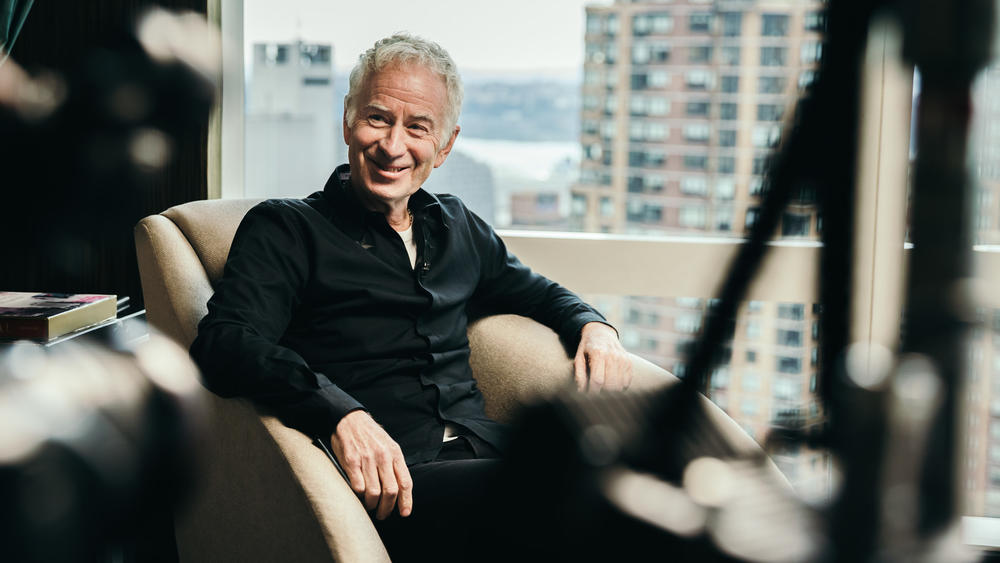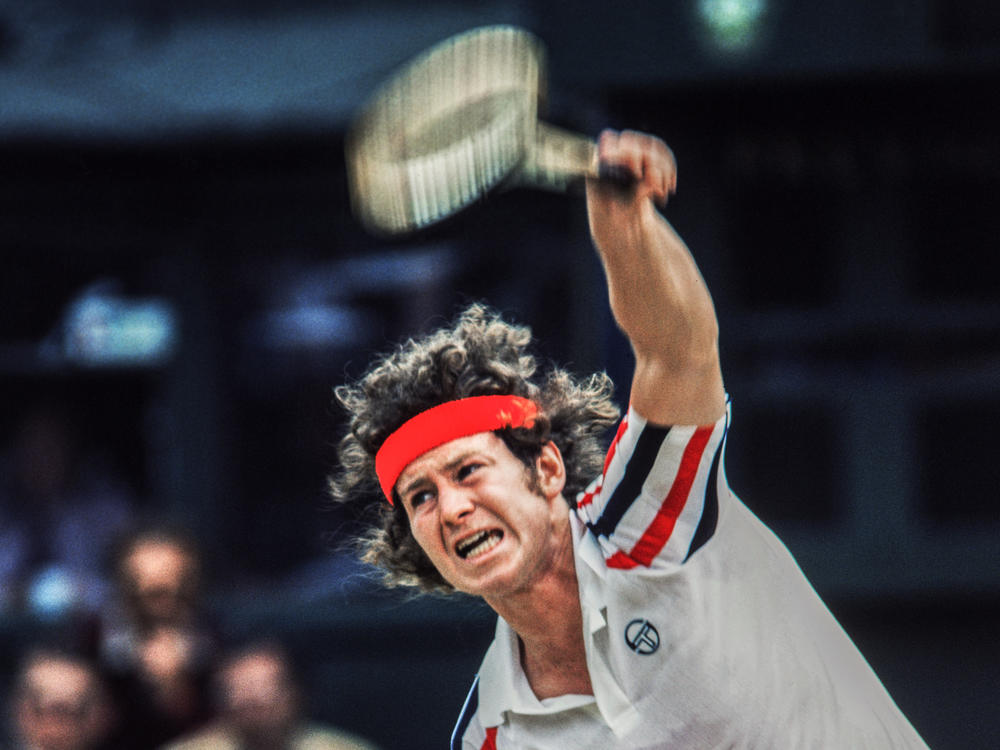Section Branding
Header Content
John McEnroe grapples with his legacy as tennis' bad boy
Primary Content
John McEnroe is remembered as one of the most talented — and hotheaded — tennis players of all time. Over the course of his career, he won 155 combined titles — more than any man in the game's modern era.
McEnroe says a formative moment of his career happened in New Orleans in 1979, during his third match against Björn Borg, a Swedish champion who was as calm on the court as McEnroe was heated.
"I was acting like a jerk for the most part. And he finally motioned up to me and said, 'Come to net,'" McEnroe remembers.
McEnroe, who was 20 at the time, expected the older player to chastise him, but instead, Borg put his arm around him and told him to enjoy himself. At first, McEnroe thought his opponent was trying to throw him off. But later he realized that Borg was right.
"It made me think, 'Look, just go out and play and do your thing because that's exciting enough and it's going to be awesome,'" he says.
Despite Borg's advice, McEnroe remained an often volatile presence on the court. His 2002 autobiography took its name from a famous dispute he had over a line call at his 1981 Wimbledon match against Tom Gullikson, in which McEnroe shouted "You cannot be serious!" when his serve was called out.
Looking back now, McEnroe is amused that his words had such staying power: "It's sort of crazy that that phrase that I said once in the first round at Wimbledon in 1981 is still something that I hear every day."
But, McEnroe adds, when ESPN revisited the call during a 40th-anniversary piece, Gullikson, acknowledged that the ball had been in — not out. "It took 40 years, but better late than never," McEnroe says. "I appreciated it."
McEnroe is the subject of a new Showtime documentary film, McENROE, directed by Barney Douglas.
Interview highlights
On examining how he plays – using creativity over muscle
Antonio Palafox, who was the Mexican player who played on the tour for many years, who taught me the way I played. And he looked at the sport as if it was sort of a geometry class and it was all about putting me in advantageous positions and putting my opponent in difficult positions. And that swirled in my head. It took me probably six, eight years to figure out what he was trying to teach me. But it clicked in and then I realized, 'OK, this is something that I can take advantage of. I'm athletic enough to do what he taught me.' And I think that that was his style of play that suited my personality, because initially when I was a kid, I couldn't do the type of aggressive style of play and the serve-volley and covering the net, that type of game that you don't see much anymore.
On what he learned from playing Jimmy Connors at Wimbledon
What I did learn as I started playing him more frequently was the intensity and the effort he gave. It was as if every point he played was the last point he was ever going to play, and I had never seen anyone that could do that, that consistently. He's sort of the Rafael Nadal of our time. That intensity and effort alone was intimidating and it was tough to match. I used to play him and I'd go back to the hotel room and I'd look in the mirror after and I go, "Did you try as hard as Jimmy Connors in that match?" And most of the time it felt like I didn't. ...
That is the greatest lesson any athlete, I think, could learn, truthfully, is if you can go out there and be able to give that type of effort consistently, that good things are going to happen. There's very few athletes in any sport that are able to go out there with that intensity. I mean, it was a remarkable quality he had. That's why he's still, in my book, one of the all time greats and brought a lot to the game because he played with such ferocity. When he went out there, he wasn't a big guy, but he played like a big guy.
On having a reputation of losing his temper on the court
First of all, I think that most of the players in the sport of tennis are remarkably well-behaved. I would consider myself more of the average Joe type of guy that goes out there. It's such a frustrating game that I was amazed that people could keep their composure as well as they did. [Jimmy] Connors, for example, I mean, I think he did worse things on the court than I did, with all due respect to him. And [Ilie] Năstase ... There were certain antics that they did that were way beyond the pale, in my book, of what I was doing. I'm not saying I'm some angel, but I'm saying they took it to vulgarity at times, situations where there would be altercations, potentially. Năstase, he was like Jekyll and Hyde, he would be on the court and you'd want to strangle the guy. And then right after the match, he used to call me macaroni. He'd go, "Macaroni. Where are we going to dinner?" And, it was over. So they taught me in a way that it was like what's on the court stays on the court. And so that was like a learning experience.
On growing up in a loud household
I used to kid around, half-kiddingly, it was a loud dinner table. [My father] used to say, "Look, you don't need to yell at the umpire. You don't need to get involved in these altercations. Just go out and play! You're better than them." But ... he didn't even realize he was [yelling] it. ... So it seemed only natural. I grew up in Queens. I commuted on the train in the subway to my high school. I was used to a lot of energy. I was very taken aback, actually, when I went to Wimbledon in London for the first time, and I was like, 'Wow, they're so polite here. This is incredible. They just act so differently.' And I'm sure they felt the same way about me. So to me, it was sort of normal. I was actually sort of taken aback that people were sort of bent out of shape, shall we say. It really surprised me.
On losing to Björn Borg in a dramatic tiebreaker at 1980 Wimbledon
[I] was aware of something that you only feel a couple of times in your career. ... It just seemed like something amazing and special was going on in that, especially in that four-set tiebreaker, there was an electricity that I never felt before that I wanted more of, and it felt incredible. And then maybe the best part ... [was I] did feel like I came out a winner in that match ultimately because I got respect from other players. I got respect from the fans. And to some extent, even the media was kind to me. They had been pretty brutal at that point. So I felt like I had taken my game and the way I was viewed up a level because of that, but also I realized I'd lost. So it made me hungrier and I think it certainly helped me those next couple of years.
On the mental toll the pressure takes on athletes
If you look back 40 years ago, I think this has been a problem, particularly for athletes in individual sports. So I think that this is something that's become more to the forefront. In certain ways, I would think it'd be easier because there's so much money. From that aspect, you don't have to worry about, "What am I going to do next?" type of thing. You have the luxury of sort of sitting back and trying to figure out ways where you can enjoy your own sport as much as possible. Naomi Osaka took a different stand and she decided to get more public about it. But to me that's in a way admirable, but in another way, it's kind of the focus is going to be more intense on her when she does play. So I think that that could have been a miscalculation because we all sit and go through that. But it's not necessarily something you want to be the first thing talked about when they talk about you.
On playing on champion teams and accepting that his best playing days are behind him
There's a phrase this great basketball player back in the '70s used to say, Connie Hawkins, he said, "The older I get, the better I used to be." And that was just unfortunately true with me. And that probably started in my mid to late 20s. So that was extremely hard to sort of have to face up to the fact that for all the effort that I made to try to get my act back together and do things to get me back to the top, I wasn't getting there. ... It got to a stage where I had to accept the fact that I'd sort of dropped a notch, and that was extremely difficult as well. But I sort of considered the situation I was in, and I tried to ... look at the glass half full and realize this: Even though I drop[ped] from one or two in the world ... it was still an incredible way to make a living.
On narrating Mindy Kaling's Netflix show Never Have I Ever, about an Indian American teenager navigating the dramas of high school
I was at a Vanity Fair Oscar party. I was walking in to take a photograph with [my wife] Patty, and as I was walking in, Mindy was walking out. ... As it turned out, her father, who was [from] India, was a big fan of mine. So somehow she came up with this idea that I should be the alter ego or psychologist or uncle or advisor to her, in essence, what I believe is her story, to a degree. She's a first-generation immigrant from India. ... And at first people are like, "Oh, this will never work. This is crazy." And I remember seeing a review or two a couple of years ago and they're like, "This is crazy, but maybe it could work." And then it did work! So it was sort of gratifying that there's people that come up to me now. I mean, this show is big, bigger outside the U.S. actually, than it is inside. I hear more and more about this and it's sort of ironic that I'm involved in this show about a high school Indian American girl trying to come to grips with growing up in a difficult situation. Although I think a lot of people can relate to the difficulties of trying to have friendships and not feeling overwhelmed in high school.
Heidi Saman and Seth Kelley produced and edited this interview for broadcast. Bridget Bentz, Molly Seavy-Nesper and Ciera Crawford adapted it for the web.
Copyright 2022 Fresh Air. To see more, visit Fresh Air.


